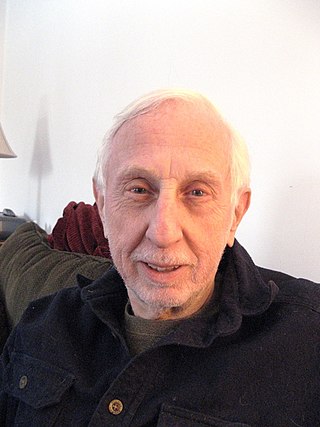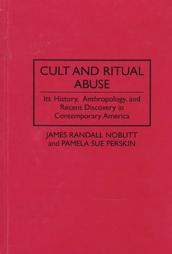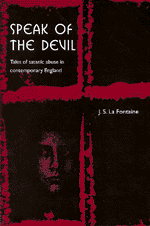Related Research Articles

Satanism is a group of ideological and philosophical beliefs based on Satan. Although several historical precedents exist, the contemporary religious practice of Satanism began with the founding of the atheistic Church of Satan by Anton LaVey in the United States in 1966. Prior to that time, Satanism existed primarily as the subject of accusations by various Christian groups toward perceived ideological opponents rather than a self-identity or expressed religious belief. Satanism, and the concept of Satan, has also been used by artists and entertainers for symbolic expression.

Lloyd deMause was an American lay psychoanalyst and social historian, best known for his pioneering work in the field of psychohistory.
The Satanic panic is a moral panic consisting of over 12,000 unsubstantiated cases of Satanic ritual abuse starting in the United States in the 1980s, spreading throughout many parts of the world by the late 1990s, and persisting today. The panic originated in 1980 with the publication of Michelle Remembers, a book co-written by Canadian psychiatrist Lawrence Pazder and his patient, Michelle Smith, which used the discredited practice of recovered-memory therapy to make sweeping lurid claims about satanic ritual abuse involving Smith. The allegations, which afterwards arose throughout much of the United States, involved reports of physical and sexual abuse of people in the context of occult or Satanic rituals. In its most extreme form, allegations involve a conspiracy of a global Satanic cult that includes the wealthy and elite in which children are abducted or bred for human sacrifices, pornography, and prostitution.

Lawrence Pazder was a Canadian psychiatrist and author. Pazder wrote the discredited biography, Michelle Remembers, published in 1980, with his patient Michelle Smith, which claimed to detail satanic ritual abuse.
LaVeyan Satanism is an atheist religion founded in 1966 by American occultist and author Anton LaVey. Scholars of religion have classified it as a new religious movement and a form of Western esotericism.

Michelle Remembers is a discredited 1980 book co-written by Canadian psychiatrist Lawrence Pazder and his psychiatric patient Michelle Smith. A best-seller, Michelle Remembers relied on the discredited practice of recovered-memory therapy to make sweeping, lurid claims about Satanic ritual abuse involving Smith, which contributed to the rise of the Satanic panic in the 1980s. While the book presents its claims as fact, and was extensively marketed on that basis at the time, no evidence was provided; all investigations into the book failed to corroborate any of its claims, with investigators describing its content as being primarily based on elements of popular culture and fiction that were popular at the time when it was written.

The Courage to Heal: A Guide for Women Survivors of Child Sexual Abuse is a self-help book by poet Ellen Bass and Laura Davis that focuses on recovery from child sexual abuse and has been called "controversial and polarizing".
Richard Noll is an American clinical psychologist and historian of medicine. He has published on the history of psychiatry, including two critical volumes on the life and work of Carl Gustav Jung, books and articles on the history of dementia praecox and schizophrenia, and on anthropology on shamanism. His books and articles have been translated into fifteen foreign languages and he has delivered invited presentations in nineteen countries on six continents.
Cathy O'Brien is an American conspiracy theorist and author who claims to have been a victim of a government mind control program called "Project Monarch", which she alleges was part of the CIA's Project MKUltra. O'Brien made these assertions in Trance Formation of America (1995) and Access Denied: For Reasons of National Security (2004), both of which she co-authored and self-published with her husband, Mark Phillips. According to scholars, there is no credible evidence for O'Brien's claims and there are numerous inconsistencies with her story.
Mary de Young is a retired professor of sociology formerly at Grand Valley State University, where from 2000 to 2003 she served as the head of the sociology department. She has published a variety of works in the area of child sexual abuse, including five books, several book chapters, and more than 35 peer-reviewed journal papers.
The San Diego Church ritual abuse case was a case of a developmentally disabled individual charged with child sexual abuse in 1991 as part of the satanic ritual abuse moral panic. After a 9-month trial, the accused was found not guilty by the jury.
Greater and lesser magic, within LaVeyan Satanism, designate types of beliefs with the term greater magic applying to ritual practice meant as psychodramatic catharsis to focus one's emotions for a specific purpose and lesser magic applied to the practice of manipulation by means of applied psychology and glamour to bend an individual or situation to one's will.
Religious abuse is abuse administered through religion, including harassment or humiliation that may result in psychological trauma. Religious abuse may also include the misuse of religion for selfish, secular, or ideological ends, such as the abuse of a clerical position.

Cult and Ritual Abuse: Its History, Anthropology, and Recent Discovery in Contemporary America is a book written by James Randall Noblitt and Pamela Sue Perskin exploring the phenomenon of satanic ritual abuse (SRA). The authors argue that some allegations of intergenerational, ritualized abuse cults are supported by evidence, contrary to most scholars of the subject who regard satanic ritual abuse as a moral panic with no factual basis. Noblitt, a clinical psychologist, is Director of the Center for Counseling and Psychological Services in Dallas, Texas. Perskin is the executive director of the International Council on Cultism and Ritual Trauma and a lecturer on child abuse.

Treating Survivors of Satanist Abuse is a collection of essays edited by Valerie Sinason addressing the treatment of those who allege they are survivors of Satanic ritual abuse. The book discusses the definitions, alleged history, scepticism about the phenomenon and ethical issues related to treating individuals reporting satanic ritual abuse. The book has been criticized by Ralph Underwager for being unscientific, defending a dubious concept with a complete lack of skepticism, possessing the veneer of science without any substance and for promoting unethical treatment practices.

Speak of the Devil: Tales of Satanic Abuse in Contemporary England is a scholarly book by J. S. La Fontaine published in 1998 that discusses her investigation of allegations of satanic ritual abuse made in the United Kingdom. The book documents a detailed investigation of the accounts of children during a wave of allegations of satanic ritual abuse, as well as the processes within the social work profession that supported the allegations despite a lack of evidence.
Research published from 2000 to 2020 illustrates increased prevalence rates of sexual violence against people with intellectual disabilities, compared to the general population.:61 The World Health Organization (WHO) funded a study which concluded that 15% of the adult population worldwide in 2012 had a disability, putting them at increased risk of physical, sexual, and intimate partner violence. Of that 15%, 6.1% or an estimated 7,008,716,704 adults worldwide had intellectual disability with 5.5% experiencing sexual violence. In another 2012 report, the WHO found that worldwide, children with intellectual disabilities experienced a 4.6 times greater risk of sexual violence than those without disability.
Elizabeth Laura Mullinar is a London-born former film casting consultant. She is one of the founders of Advocates for Survivors of Child Abuse and is the Founder of the Heal For Life Foundation and created the TREE Model of Trauma Recovery. Mullinar is regarded as an expert in the field of trauma. In 2019, she presented the TREE model at the International Congress of Trauma and Attachment alongside other trauma experts including American Psychiatrist Daniel J. Siegel, and British Psychoanalyst Peter Fonagy OBE.
The International Society for the Study of Trauma and Dissociation (ISSTD) is a nonprofit professional organization of health professionals and individuals who are interested in advancing the scientific and societal understandings of trauma-based disorders, including posttraumatic stress disorder, complex posttraumatic stress disorder, and the dissociative disorders.
Diana Louisa Napolis, also known by her online pseudonym Karen Curio Jones or more often simply Curio, is an American former social worker. Between the late 1990s and 2000, Napolis posted a series of pseudonymous accusations alleging that individuals skeptical of the satanic ritual abuse moral panic were involved in a conspiracy to cover up the sexual abuse and murder of children. The pseudonymous poster's real life identity was confirmed as Napolis in 2000.
References
- ↑ Sinason V (2010). Mental Handicap and the Human Condition: An Analytic Approach to Intellectual Disability. London; New York: Free Association Books. ISBN 978-1-85343-202-6.
- ↑ Miller, Lynda; Simpson, David W. (2004). Unexpected Gains: Psychotherapy With People With Learning Disabilities (Tavistock Clinic Series). London: Karnac Books. ISBN 1-85575-964-0.
- ↑ Sinason, V (1994). Treating Survivors of Satanist Abuse . London: Routledge. ISBN 0-415-10543-9.
- ↑
- Ben-Yehuda N, Goode E (1994). Moral panics: the social construction of deviance. Oxford: Blackwell. pp. 57–65. ISBN 0-631-18905-X.
- Jenkins, P (1998). Moral Panic: Changing Concepts of the Child Molester in Modern America. New Haven, CT: Yale University Press. pp. 207–231. ISBN 0-300-10963-6.
- Victor JS (1993). Satanic Panic: The Creation of a Contemporary Legend. Open Court Publishing Company. pp. 55–6. ISBN 0-8126-9192-X.
- de Young, Mary (2004). The Day Care Ritual Abuse Moral Panic. Jefferson, North Carolina, United States: McFarland and Company. pp. 42. ISBN 0-7864-1830-3.
- ↑ Lafontaine, JS (1994). Extent & Nature of Organized Ritual Abuse. Department of Health. ISBN 0-11-321797-8.
- ↑ Thompson, D (22 March 2002). "The people who believe that Satanists might eat your baby". The Daily Telegraph .
- ↑ Brindle, David (10 February 2000). "Satanic abuse row erupts". The Guardian.
- ↑ "Portman and tavistock clinic pilot study on alleged organsied ritual abuse - a Freedom of Information request to Department for Education". WhatDoTheyKnow. 13 February 2017.
- 1 2 Laurance, J (1 March 2001). "I was wrong about cannibalism". The Independent . via HighBeam Research. Archived from the original on 25 January 2013.
- ↑ Herman, J. L. (26 May 1993). "Adult memories of childhood trauma: current controversies". Paper presented at the annual meeting of the American Psychiatric Association in San Francisco, CA.
- ↑ McFarlane, R. B.; Lockerbie, G (1994). "Difficulties in treating ritually abused children". Journal of Psychohistory. 21 (4): 429–434.
- ↑ Sakheim, D. K.; Devine, S. E. (1992). Out of the darkness: Exploring Satanism and ritual abuse. New York: Lexington/MacMillan. pp. 279–293. ISBN 9780669269628.
- ↑ Bloom, S. L. (1994). "Hearing the survivor's voice: Sundering the wall of denial". Psychohistory. 21 (4): 461–477.
- ↑ Leavitt, F (1997). "False attribution of suggestibility to explain recovered memory of childhood sexual abuse following extended amnesia". Child Abuse and Neglect. 21 (3): 265–272. doi:10.1016/S0145-2134(96)00171-8. PMID 9134257.
- ↑ Barstow, D. (1993). "A critical examination of the false memory syndrome". Family Violence & Sexual Assault Bulletin (9): 21–22.